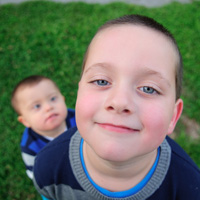Modern Parenting May Hinder Brain Development

Despite our best efforts to protect and nurture our children, life outcomes for North American youth are worsening, especially in comparison to 50 years ago. Ill-advised practices and beliefs have become commonplace in our culture, such as the use of infant formula, the isolation of infants in their own rooms or the belief that responding too quickly to a fussing baby will “spoil” it say researchers.
New research from the University of Notre Dame links early, nurturing parenting practices such as breastfeeding, responsiveness to crying, consistent touch and having multiple adult caregivers to the development of positive behavioural traits. These include: optimal physical health, and positive personality and moral development.
These parenting practices were common in hunter-gatherer societies and have unfortunately been lost in many methods of modern parenting. These nurturing ancestral parenting practices, however, are shown to positively impact the developing brain.
Research shows that responding to a baby's needs rather than letting your child “cry it out” has been shown to influence the development of conscience. Positive touch affects stress reactivity, impulse control and empathy. Free play in nature influences social capacities and aggression, and having a set of supportive caregivers (beyond the mother alone) positively impacts IQ, ego resilience and empathy.
Research shows that North America has been on a downward trajectory on all of these care characteristics. Instead of being held, infants spend much more time in carriers, car seats and strollers than they did in the past. Only about 15 percent of mothers are still breastfeeding by the time children reach the age of one, extended families are broken up due to distance and other circumstances, and free play outdoors has decreased dramatically since 1970.
Luckily the effect of these negative patterns can be reversed. Teachers can have a beneficial impact when a child feels safe in their presence, and parents can take up a creative activity with a their child at any point and grow together.

